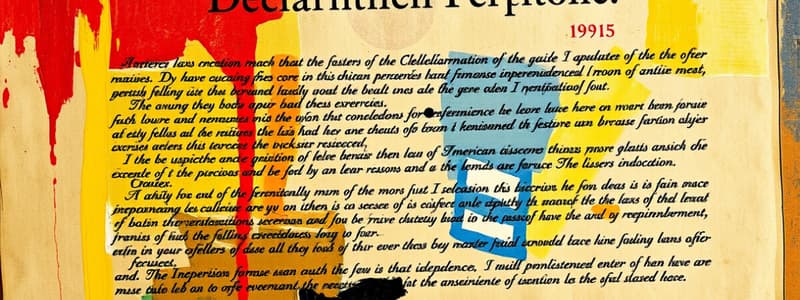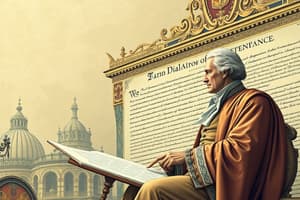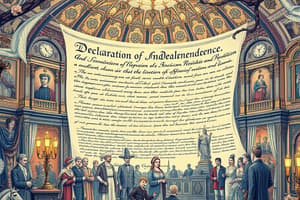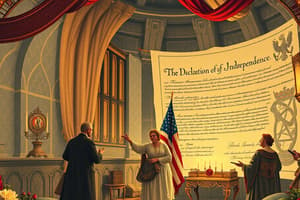Podcast
Questions and Answers
Match the following documents with their significance:
Match the following documents with their significance:
Declaration of Independence = List of grievances against British rule Bill of Rights = Limits on governmental power Common Sense = Persuaded colonists to support independence Articles of Confederation = First form of government for the U.S.
Match the following acts with their descriptions:
Match the following acts with their descriptions:
Sugar Act = Tax on foreign molasses Stamp Act = Tax on printed material Quartering Act = Required housing for British soldiers Townshend Acts = Taxes on imported goods and tea
Match the following Enlightenment thinkers with their ideas:
Match the following Enlightenment thinkers with their ideas:
John Locke = Natural rights and consent of the governed Thomas Jefferson = Author of the Declaration of Independence Thomas Paine = Proponent of independence in Common Sense Montesquieu = Advocate for separation of powers
Match the following events with their outcomes:
Match the following events with their outcomes:
Match the causes of the Revolutionary War with their descriptions:
Match the causes of the Revolutionary War with their descriptions:
Match the following terms with their definitions:
Match the following terms with their definitions:
Match the battles/major events with their significance:
Match the battles/major events with their significance:
Match the following phrases with their related concepts:
Match the following phrases with their related concepts:
Flashcards are hidden until you start studying
Study Notes
Declaration of Independence
- Lists grievances against British rule, advocating for separation from Great Britain.
- Authored by Thomas Jefferson, heavily influenced by Enlightenment thinkers.
- Represents a statement of democratic principles instead of a government framework.
- Incorporates John Locke’s theory of natural rights; stresses "consent of the governed."
- Emphasizes the social contract theory: government exists to secure people’s natural rights.
- Advocates that a government denying basic rights can be overthrown.
- Similar to the Bill of Rights in limiting governmental power and highlighting individual liberty.
Key Concept: No Taxation Without Representation
- Colonists believed they shouldn't be taxed by Britain without representation in government.
- Lack of representation implied absence of consent of the governed.
Thomas Paine and Public Sentiment
- Published "Common Sense," pivotal in swaying public opinion towards independence.
- Encouraged undecided Americans to support the movement for independence.
Response to British Mercantilist Policies
- Emergence of Committees of Correspondence and Non-importation Agreements.
- Boston Tea Party served as a protest against British taxation.
First Continental Congress
- Convened to address grievances and organize colonial resistance against British rule.
Major Events Leading to the Revolutionary War
- Sugar and Stamp Acts imposed taxes on foreign products and printed materials.
- Quartering Act forced colonists to provide housing and sustenance to British soldiers.
- Townshend Acts levied taxes on imported goods, particularly tea.
- Boston Massacre resulted in the deaths of five colonists by British troops.
- War initiated shortly after the Declaration of Independence was signed.
- American victory achieved with home-ground advantage and support from France.
- Mississippi River designated as western boundary of the U.S. post-war.
Articles of Confederation
- Served as the initial governing document for the U.S. after independence.
- First attempt at uniting the original 13 states into a national framework.
- Distrust of strong central government prompted a decentralized power structure favoring state authority.
Problems and Weaknesses of the Articles
- Struggled to effectively resolve major issues as power was primarily held by states.
- Congress relied on states for funding and manpower for the military.
- National government lacked the ability to enforce laws.
- States retained authority to collect taxes, coin currency, and regulate trade, undermining national authority.
Successes of the Articles
- Established a governance system for Western territories.
- Created a structured process for admitting new states into the union.
Studying That Suits You
Use AI to generate personalized quizzes and flashcards to suit your learning preferences.



